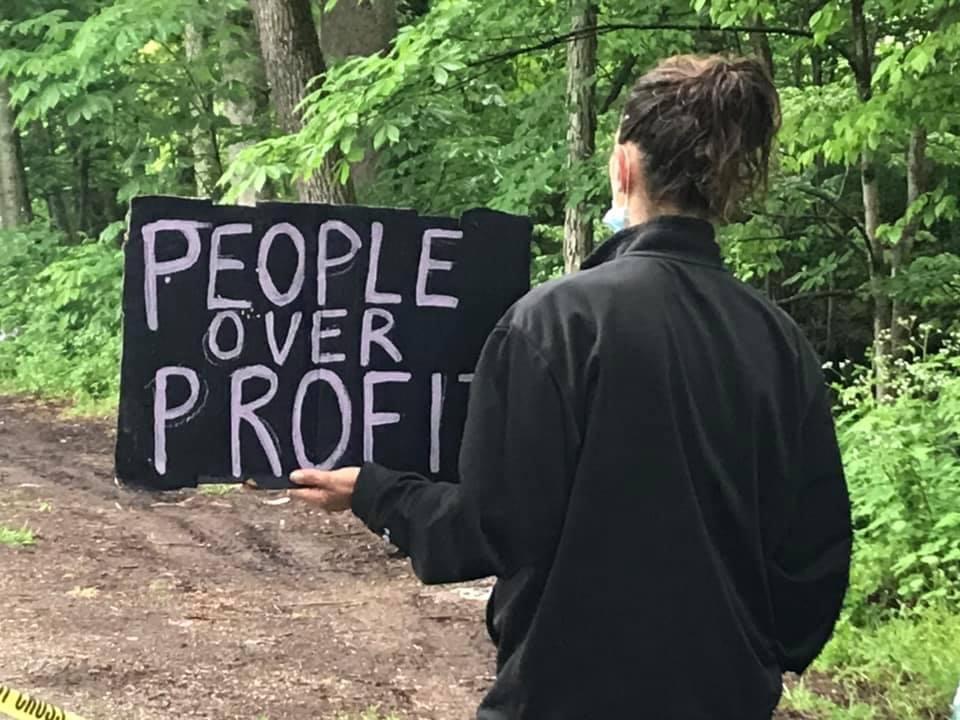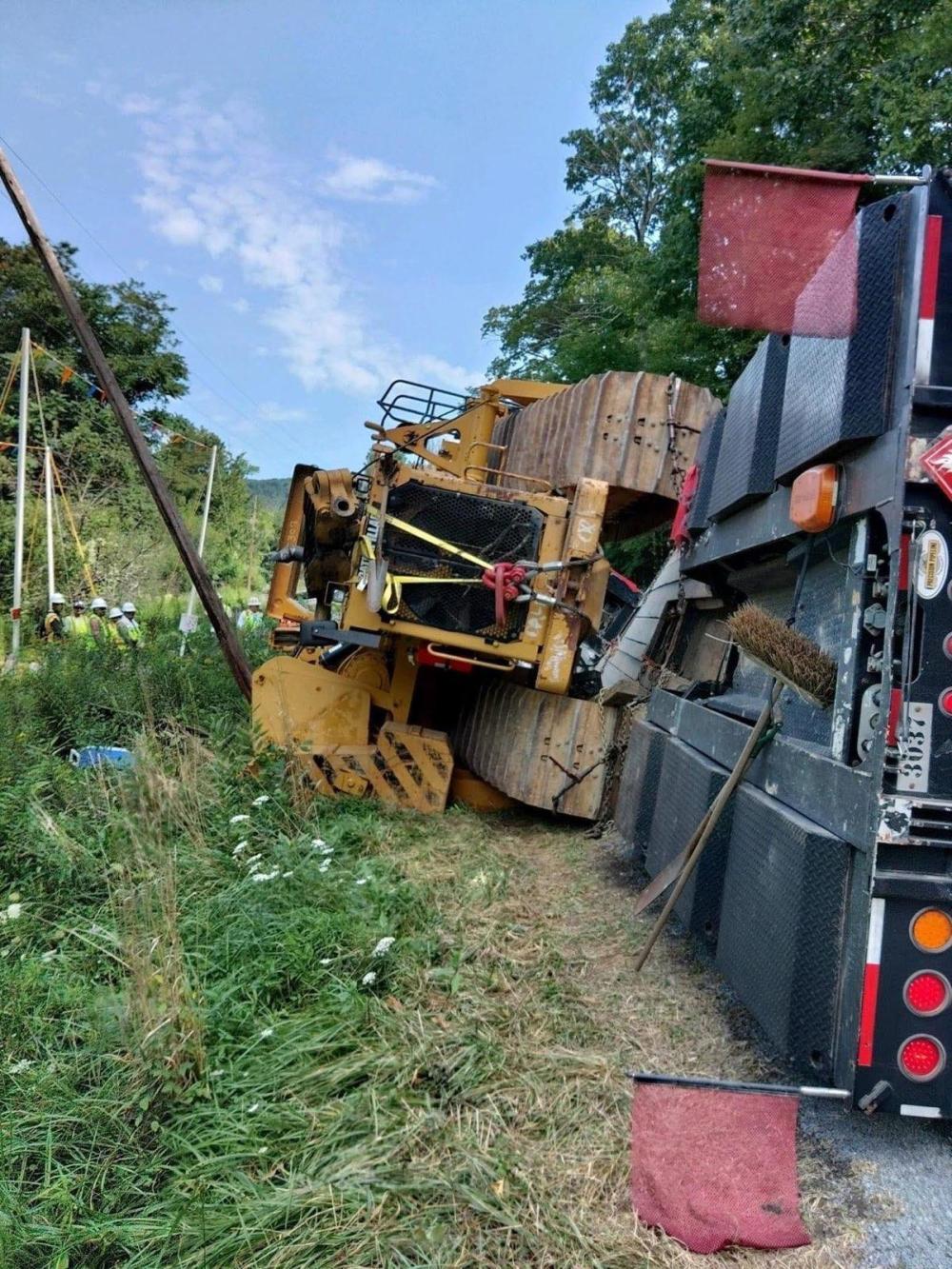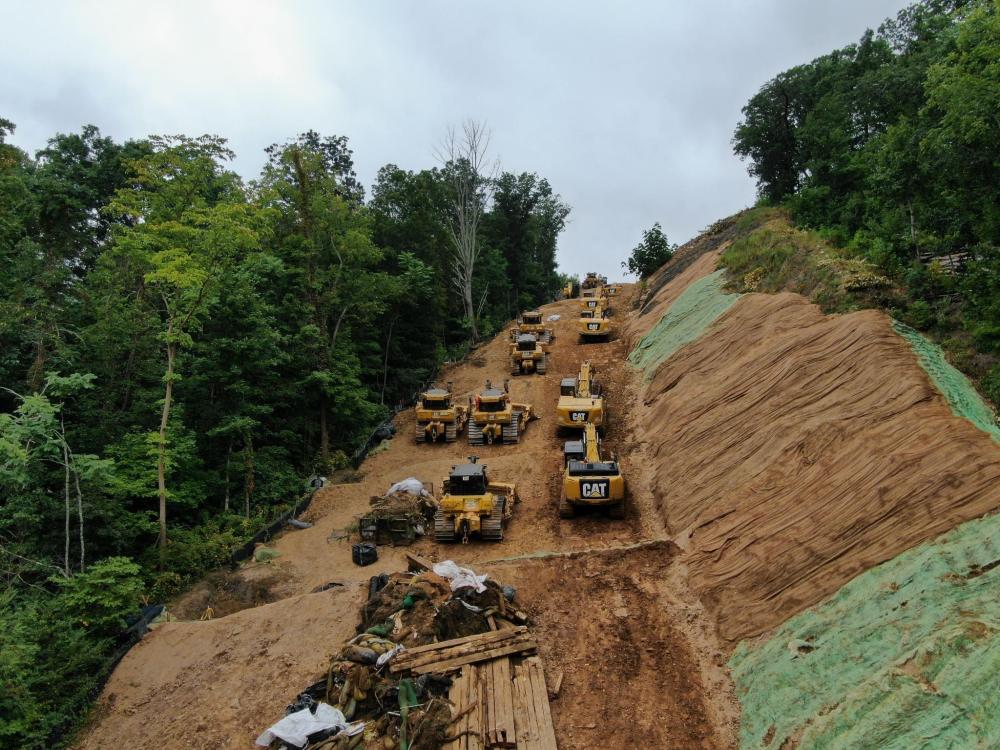“Don't give up on us here in Appalachia”: Fighting the Mountain Valley Pipeline

Crystal Mello wears a tie-dye shirt and smiles for the camera
Sarah Hazelgrove
Activist spreads awareness about construction and pollution risks
Crystal Mello remembers a time when her town, Shawsville, had banks, a carwash and a laundromat. Now, there’s just one gas station and two Dollar General stores serving about 3,000 people, mostly blue-collar or service workers deemed essential at the onset of the pandemic.
Mello has lived in Shawsville—on unceded Monacan and Tutelo land in the Appalachian Mountains of what is now called Virginia—for over 20 years. She says it’s the poor section of Montgomery County—"like the normal rural town that you pass through when you're going somewhere else”—but also the most beautiful part.
“When you drive through here, it's just mountains hugging you on each side of [Highway] 460. But Shawsville and Elliston is where the pipeline's coming through,” Mello said.
That would be the notorious Mountain Valley Pipeline (MVP), an approximately 300-mile gas line boring through the Appalachians and speeding toward completion by the end of 2023. The project has already disrupted communities and dirtied waterways in the region. Once completed, it will carry the combined greenhouse-gas impact of 19 million cars.
Mello spends her days cleaning houses and doing jail solidarity work, but since the construction on the Mountain Valley started five years ago, her free time is mostly spent speaking to people about its negative effects. “Folks around here deserve a lot better,” she said.
“It has sadly become a part of my life, which sucks because I have a kid who is a senior this year whose summer sucked, because we were going to DC or lobbying,” said Mello. Mello also has a one-year-old granddaughter and a 12-year-old grandson. “These are things that I'm missing out on because a lot of people aren't fighting the pipeline in my community.” But because of what’s at stake—because the folks in her small town do deserve a lot better—being silent is not an option.

Crystal Mello stands holding a sign that reads: 'People Over Profit'
Construction risks and pipeline exposure triggered alarm
Mello’s opposition to the pipeline began at the start of 2018, when she and her son saw it was set to cross a local river. “I knew the pipeline was around, but didn't know it was coming through here,” recalled Mello. She later learned that people had started going to board meetings to fight the pipeline years earlier. Soon Mello toured part of the pipeline itself with another community member. Such tours have proved helpful for documentation of the construction.
Mello also is no stranger to the dangers of building this pipeline.
“I've seen excavators flipped. I almost got killed by a root ball that they dislodged. A little pine got taken down. The little chair I was sitting in was in the creek. I know how dangerous this project is.”
The dangers don’t stop with construction. Pipelines always run the risk of leaking. Additionally, exposure to the elements may cause the MVP or its protective epoxy coating to corrode. And it’s unclear whether the pipeline is being properly maintained. Mello said, “I've been to a couple places recently where they have not started to recoat the tops of the pipe. It makes me wonder, ‘are they not gonna recoat these places that people don't have good eyes on?’”
Another big concern for any pipeline is explosions. People living in the MVP’s “blast zone” — the distance from an explosion in which people would probably be killed or suffer serious injury — have told Mello they’re worried about their bodies being identified. Some are even registering new P.O. boxes to keep their identity documents safe in case of a blast. It’s clear the stakes are dire.

An excavator lays flipped on its side
Diversity of tactics needed, but safety concerns key
Mello recognizes a diversity of tactics is needed to stop the pipeline. Aside from “talking to anybody who will listen” in her everyday life, Mello also canvasses, stressing the safety issues of the pipeline.
“I'll joke around and be like ‘we're holding McDonald's more accountable for barbecue sauce than we're holding this [pipeline] company.’”
She tells it like it is, often starting with a point like, “there's not even an odorant in this, so if it was leaking, we wouldn't smell it,” or “I heard about this landslide in West Virginia where three pipes slid.” She has a lot of fodder, unfortunately. The pipeline was responsible for more than 300 water violations in 2018 alone. “I start talking about how unsafe it is, then they're like, ‘yeah, it is messed up.’”
“We are on our own fighting this except for folks who help uplift these stories and people who come in and do direct actions,” said Mello.
Direct action protests are key, too. People have engaged in tree-sitting, with one tree sit in Elliston, a town near Mello's home, lasting 932 days. Mello herself stayed in a tree for three days. Solidarity and support for the people doing these protests is also important—“whether it's bringing ice or some gear, you know, vegetables, toilet paper, hanging out, letting 'em know that we appreciate them.”

Several excavators sit along the pipeline route
Fight against pipeline an uphill battle
Due to the outsized power and presence of big-money oil and gas executives, Mello is often asked why she wastes her time fighting the pipeline. This adds even more drive to her fight.
The community certainly does face obstacles. Mello said it’s hard for people to get to board meetings in Richmond to register their opposition. Most in the area have day jobs, and not everyone’s car is capable of making the trip.
There is also disinformation to contend with (like claims that MVP is almost done), whether people are getting it from social media, their work in the oil and gas industry or the security guy from the pipeline construction site. Mello and other activists push back by pressing journalists to report accurately about the pipeline. They hope more nuanced information about the project will lead others to get involved in stopping it.
Then there’s the series of political and legal setbacks faced by Mello and her community. “We've shown all the evidence, we've done all the hard work, and it was just taken away from us with that budget [bill]” Mello stated. She was talking about the June 2023 Senate passage of a debt-ceiling bill that mandated completion of the MVP. Until recently, there was a pause on all new construction activity pending litigation, but a court of appeals dismissed the case, allowing the MVP to proceed. Still, until it’s completed and in use, the future of the pipeline remains uncertain—which means it’s still “all hands on deck.”
A safe and just future can only happen with community involvement
At the end of the day, Mello says the relationships she’s forming with people fighting the pipeline keep her grounded. Supportive calls from people just checking in make all the difference.
If folks would like to get involved, Mello named several organizations to tap into and recommended resources like StopMVP.Org.
“Find a group, there's plenty of 'em where you can tap into."
"This pipeline could possibly kill people and we need all the people we can monitoring, taking pictures and reminding people about Appalachian Voices, Appalachians Against Pipelines, 7 Directions of Service, Wild Virginia, West Virginia Rivers and Mountain Valley Watch,” said Mello.
She said a safe and just future looks like pouring resources back into the community. Equipping them with fresh food, clean water, community spaces, internet, public transportation and sustainable resources like solar energy is vital.
“Don't ever give up on us here in these parts of Appalachia. We're working hard. There's a lot of good people trying to do good work and learn. It's just probably taken a little bit more time and it's not as broadcasted. We're working hard to make it a just community for all lives.”
Crystal Mello’s story is part of a collection in “5 Stories: Resistance in the era of fossil fuels and climate change” where we talk to community members organizing, rallying and fighting back against the various stages of the fossil fuel lifecycle, from the point of oil and gas extraction to the climate extremes it creates.
